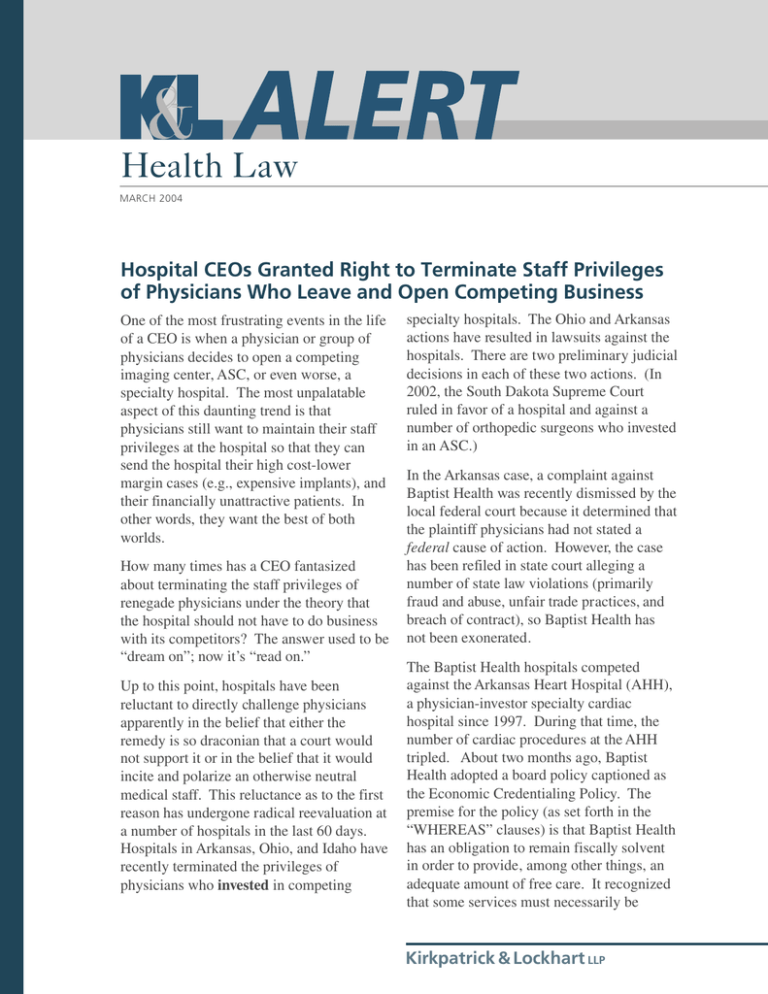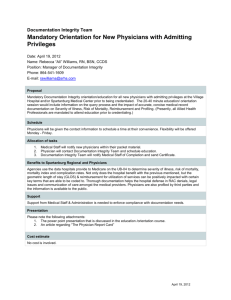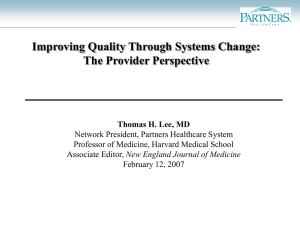Health Law
advertisement

Health Law MARCH 2004 Hospital CEOs Granted Right to Terminate Staff Privileges of Physicians Who Leave and Open Competing Business One of the most frustrating events in the life of a CEO is when a physician or group of physicians decides to open a competing imaging center, ASC, or even worse, a specialty hospital. The most unpalatable aspect of this daunting trend is that physicians still want to maintain their staff privileges at the hospital so that they can send the hospital their high cost-lower margin cases (e.g., expensive implants), and their financially unattractive patients. In other words, they want the best of both worlds. How many times has a CEO fantasized about terminating the staff privileges of renegade physicians under the theory that the hospital should not have to do business with its competitors? The answer used to be “dream on”; now it’s “read on.” Up to this point, hospitals have been reluctant to directly challenge physicians apparently in the belief that either the remedy is so draconian that a court would not support it or in the belief that it would incite and polarize an otherwise neutral medical staff. This reluctance as to the first reason has undergone radical reevaluation at a number of hospitals in the last 60 days. Hospitals in Arkansas, Ohio, and Idaho have recently terminated the privileges of physicians who invested in competing specialty hospitals. The Ohio and Arkansas actions have resulted in lawsuits against the hospitals. There are two preliminary judicial decisions in each of these two actions. (In 2002, the South Dakota Supreme Court ruled in favor of a hospital and against a number of orthopedic surgeons who invested in an ASC.) In the Arkansas case, a complaint against Baptist Health was recently dismissed by the local federal court because it determined that the plaintiff physicians had not stated a federal cause of action. However, the case has been refiled in state court alleging a number of state law violations (primarily fraud and abuse, unfair trade practices, and breach of contract), so Baptist Health has not been exonerated. The Baptist Health hospitals competed against the Arkansas Heart Hospital (AHH), a physician-investor specialty cardiac hospital since 1997. During that time, the number of cardiac procedures at the AHH tripled. About two months ago, Baptist Health adopted a board policy captioned as the Economic Credentialing Policy. The premise for the policy (as set forth in the “WHEREAS” clauses) is that Baptist Health has an obligation to remain fiscally solvent in order to provide, among other things, an adequate amount of free care. It recognized that some services must necessarily be Kirkpatrick & Lockhart LLP ge se operated at a net loss, which, of course, sets up the argument that it cannot afford any erosion of its profitable services. The policy reaffirms that medical necessity should be the only criteria for a physician’s admitting decision and asserts that other hospitals which have financial relationships with physicians “may require or provide financial incentives” to the physicians to direct patients to these other hospitals. Reportedly, a group of neurosurgeons and orthopods are also planning to build their own specialty hospital, which is likely why Baptist Health acted now to adopt this policy. revenue earned thereon) to coerce, direct, and reward physicians’ admissions exclusively to Baptist Health. Notably, the policy provides for the automatic revocation of staff privileges without a hearing. At least six of Baptist Health’s physicians invested in the AHH. Baptist Health severed the privileges of two physicians immediately; four others are under threat of a similar fate when their privileges are up for renewal next year. In the Ohio case, 17 physicians in Columbus sued OhioHealth, a nonprofit system in Columbus, after they lost their privileges for investing in a competing 42-bed orthopedic specialty hospital. OhioHealth predicts it will lose up to $20 million annually from this specialty hospital, and at least two other large systems are predicting losses in the same order of magnitude. The physicians filed their complaint in federal court, alleging a violation of the federal anti-kickback statute and violations of similar Arkansas state anti-kickback statutes. The federal court dismissed the complaint because the federal anti-kickback statute does not create a private right of action, meaning that only the government and not private individuals, can enforce the statute. Additionally, the court determined that a state court could adequately interpret its state’s statutes without intervention from or the need for a preliminary decision from the federal court. The primary argument advanced by these plaintiff physicians (and the plaintiff physicians in the other actions) is that Baptist Health’s actions violate the antikickback and anti-referral rules. In the eye of the plaintiff physicians, Baptist Health is using an item of value, i.e., hospital privileges (and the flow of patients and 2 Baptist Health, on the other hand, is arguing that it has the right to establish and defend its financial solvency and that it has no duty to provide access to or to do business with its competitors. Baptist Health is also saying that an ownership in, or some other financial incentive offered by the other institution, is substantially different than a decision to refer to a facility in which the physician has no economic interest. Last week, an Ohio state court judge refused to grant the physicians’ request for a preliminary injunction. This is a very important ruling because it signals that the court may believe that the physicians’ case is not sufficiently strong to ultimately prevail. (There are any number of reasons that a court will not grant a preliminary injunction. There might be adequate dollar damages or that public policy disfavors an injunction. The likelihood of the moving party not ultimately prevailing on the merits is a frequent reason why a judge will not grant a preliminary injunction). These two cases and others like it are far from over. Given the diversity of the fact patterns and venues (e.g., 50 state courts and 12 federal circuit courts), one can expect a plethora of decisions, including conflicting results, before this issue is ultimately decided. The important thing to remember KIRKPATRICK & LOCKHART LLP HEALTH LAW ALERT is not to read too much into the outcomes of these early cases, one way or the other. considering a conflict of interest policy may be sufficient to quell enthusiasm of those physicians who may be contemplating investing in a competing facility. It also makes sense to support legislative efforts to continue the specialty hospital ban. Alternatively, the issue could also be decided by statute--following the lead of Congress when it imposed an 18-month moratorium on the referral to specialty hospitals last fall. Congress amended the Stark anti-referral statute, but left enough “wiggle room” to still permit bolder entrepreneurs to continue with their development plans so that they are ready when the ban expires. Ahhh, it’s enough to make you long for the good old days when hospitals were only worried about physicians putting blood labs into their rented MOB offices. Until then, however, it makes sense for CEOs to discuss this matter, including the possible adoption of similar plans, with their boards. The notion that the board is If you would like to read the Court’s decision, the complaint, or the Baptist Economic Credentialing policy, please click here (or visit http://www.kl.com/ downloads/Murphy-v-Baptist-Health.pdf). EDW ARD WEISGERBER EDWARD eweisgerber@kl.com 412.355.8980 FOR MORE INFORMATION, please contact one of the following K&L lawyers: Boston R. Bruce Allensworth ballensworth@kl.com Edward J. Brennan, Jr. ebrennan@kl.com 617.261.3119 617.951.9143 Harrisburg Ruth E. Granfors Raymond P. Pepe rgranfors@kl.com rpepe@kl.com 717.231.5835 717.231.5988 Miami Marc H. Auerbach William J. Spratt, Jr. mauerbach@kl.com wspratt@kl.com 305.539.3304 305.539.3320 Newark Stephen A. Timoni stimoni@kl.com 973.848.4020 Pittsburgh Judy J. Hlafcsak Edward V. Weisgerber jhlafcsak@kl.com eweisgerber@kl.com 412.355.8920 412.355.8980 Washington Alan J. Berkeley aberkeley@kl.com 202.778.9050 ® Kirkpatrick & Lockhart LLP Challenge us. ® www.kl.com BOSTON ■ DALLAS ■ HARRISBURG ■ LOS ANGELES ■ MIAMI ■ NEWARK ■ NEW YORK ■ PITTSBURGH ■ SAN FRANCISCO ■ WASHINGTON ......................................................................................................................................................... This bulletin is for informational purposes and does not contain or convey legal advice. The information herein should not be used or relied upon in regard to any particular facts or circumstances without first consulting a lawyer. FEBRUARY 2004 © 2004 KIRKPATRICK & LOCKHART LLP. ALL RIGHTS RESERVED. Kirkpatrick & Lockhart LLP






